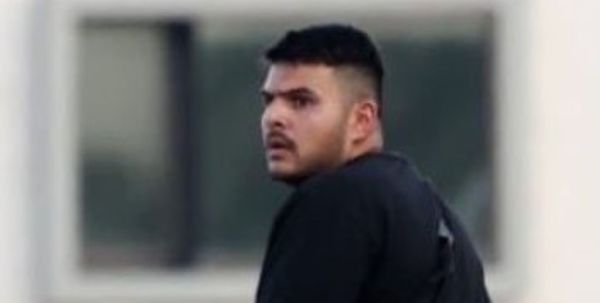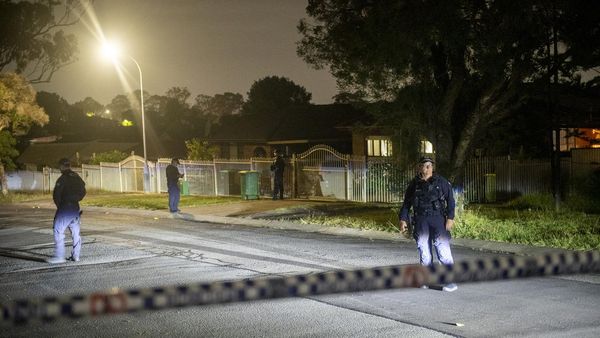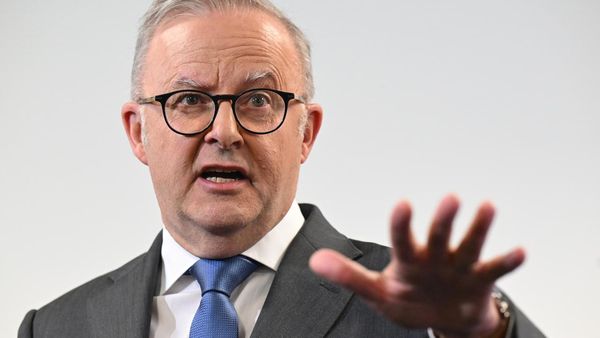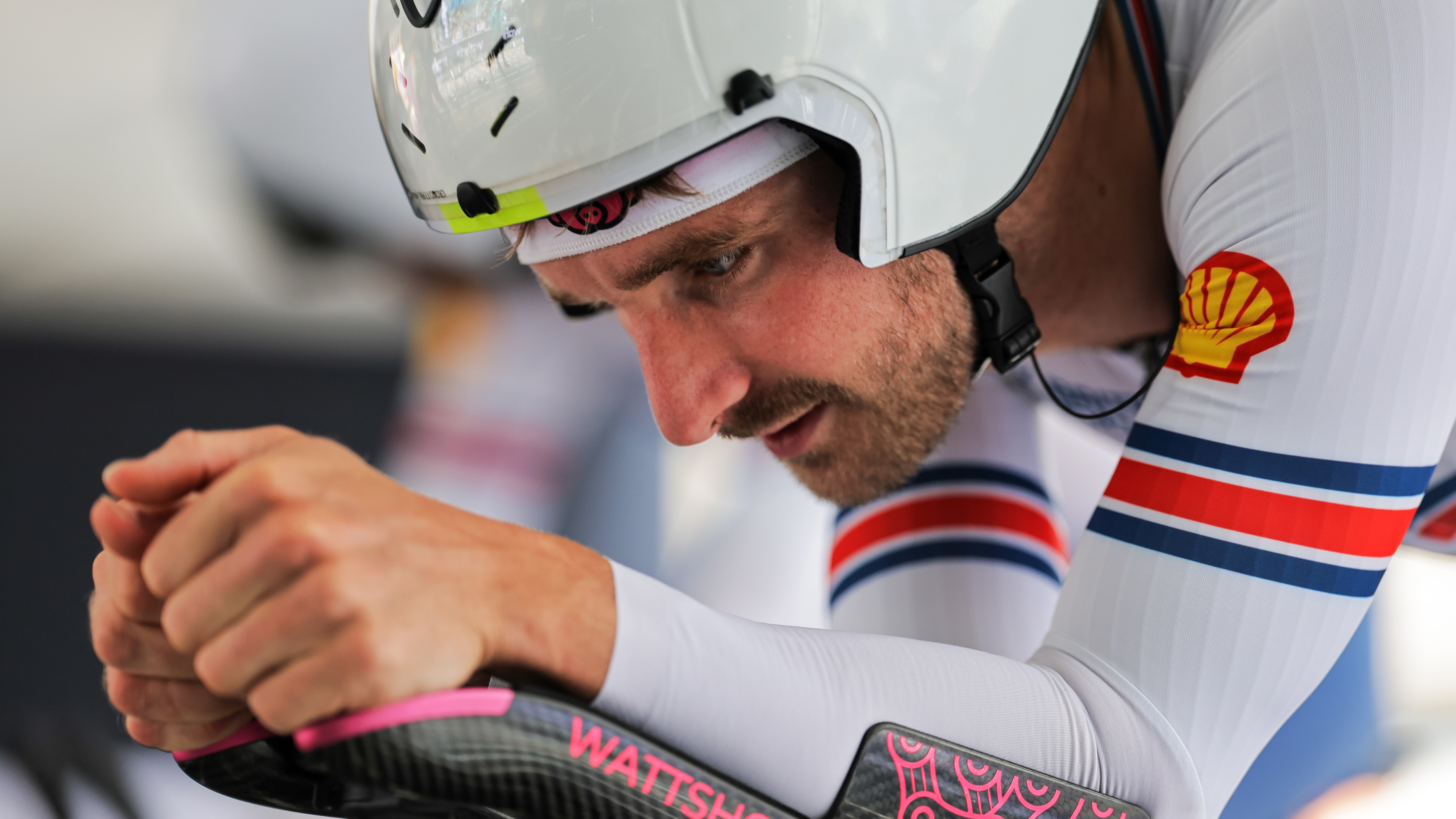
A few weeks ago, a funny thing happened. A chunk of money dropped into Dan Bigham’s bank account. This was in remuneration for his services as a rider on the Great Britain team for the upcoming Olympics in Paris. It was funny because it was the first time Bigham had ever been paid to turn a set of pedals. He could, for the first time, call himself a professional bike rider.
Bizarre as that may sound for a former World and European Champion, an Hour Record holder, and a potential Olympic gold medallist in a couple of weeks’ time, it is technically true.
“My definition of a profession is something that puts food on the table, pays the bills, roof over your head… whatever you want to call it, you have an income that you live off, and I’ve never had that,” Bigham tells Cyclingnews in a wide-ranging interview ahead of the Paris Olympics.
This lack of income is no sob story, though. Rather, it tells the story of Bigham’s unique journey through the sport, one of multiple talents, multiple facets, and a singular courage in his own convictions.
The primary reason for that lack of remuneration is the fact that Bigham has always had day jobs. A Masters-level engineering graduate, he worked in Formula 1 and with several British sporting federations before diving into cycling, where he has ridden on the road in races like the Tour of Britain and World Championships, and on the track in the biggest international competitions, but always in his ‘spare’ time.
He set up Wattshop, a range of aero-minded cycling products, shortly after university and still manages what has become a thriving business that employs several of his family members. He has also worked as an aerodynamics consultant for Visma-Lease a Bike, the Danish cycling federation, and, for the past two and a half years, at Ineos Grenadiers as their ‘performance engineer’.
On the road, he has only ever ridden for Continental teams, notably Ribble Weldtite, but he points out the lack of finances on the domestic UK scene and suggests that only two riders on the now defunct Ribble team were ever salaried. On the track, his own ground-breaking, establishment-toppling HUUB-Wattbike team (more on that later) invested all their sponsorship in running the set-up rather than paying riders, and when he has been part of the British Cycling establishment, it has been expenses-only, given his non-riding jobs have rendered him ineligible for the public funding grants (APAs) received by most dedicated British Olympians.
The only reason he has finally received a paycheck is that he has had to take three months of unpaid leave from Ineos Grenadiers in order to pursue his Olympic ambitions, making him eligible for a short-term APA.
“That’s the first time someone has put money in my hand to ride my bike, although nothing has changed around how I approach performance or anything. I have savings, but I’d prefer not to be eating into them to pay for everything that life brings,” he says.
“The finances in the lower tiers of the sport are not widely talked about. Most riders aren’t doing it to be millionaires. They’re doing it because they love the sport, and they just want to make ends meet. I’m simply lucky to have another career that pays well.”
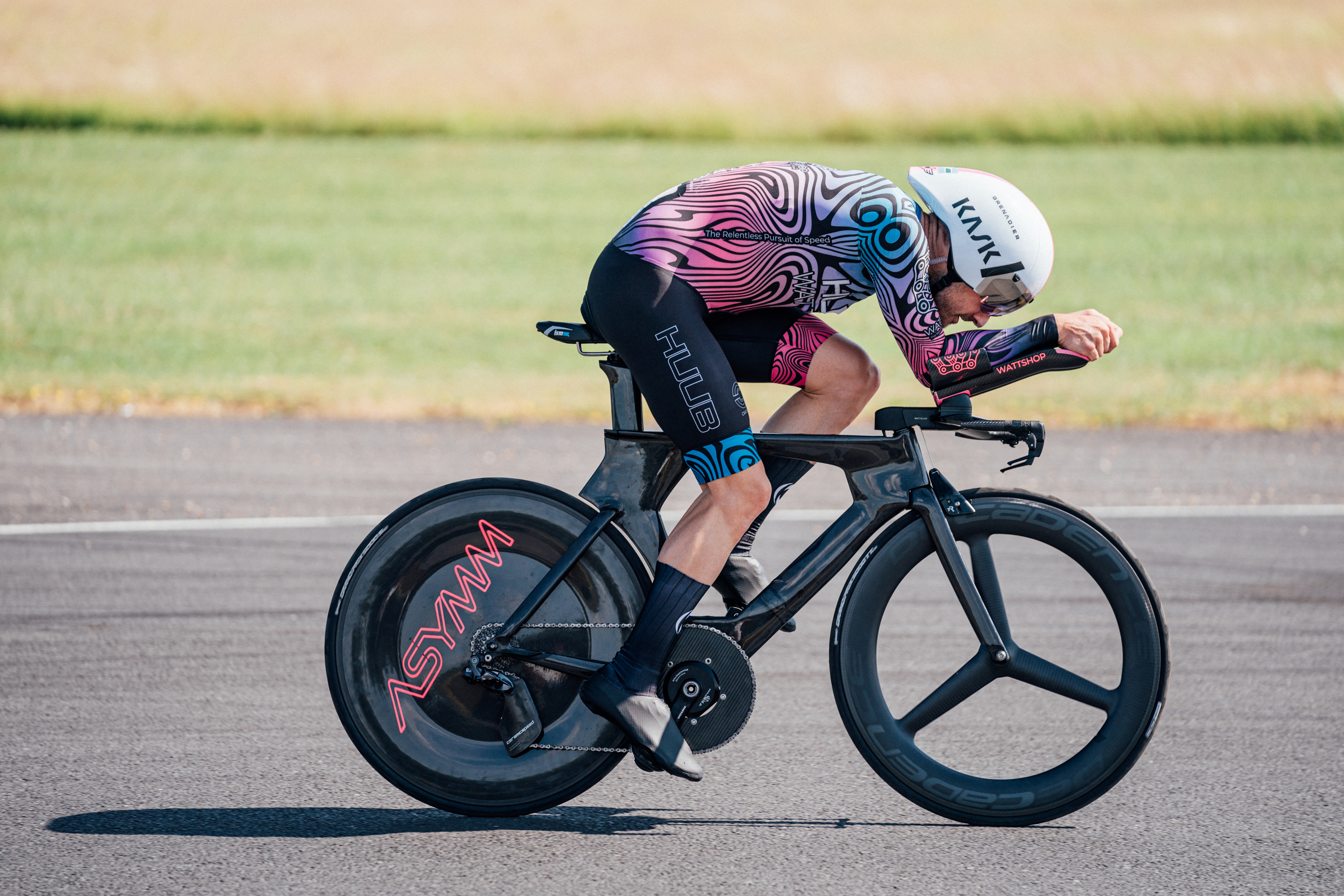
Sticking to his own plan
Bigham’s return to the British Cycling establishment has been one of the most gripping narratives heading into this summer’s Olympics. A few years ago, Bigham was persona non grata at the national federation. He butted heads with senior management, he embarrassed them with HUUB-Wattbike, and he committed an act of treason, as some would have it, by working for another nation. Now, though, he is an influential figure and the figurehead of the Team Pursuit squad who are legitimate gold medal contenders in Paris.
Bigham’s first conversations over going full-time on the track with British Cycling came in 2017, but within a year the relationship had already broken down beyond repair. He rode the individual pursuit at the 2018 Track World Championships and Commonwealth Games, but was not part of the team pursuit squad – “a point of contention”, he notes, six years on.
He was then called to a meeting with performance director Stephen Park, head coach Iain Dyer, and head of performance support team Paul Barrett, with the aim of setting out what it would actually take to be a part of British Cycling’s Olympic programme. “Iain decided not to show up to the meeting,” Bigham says pointedly. “And I didn’t get much clarity on things.”
Soon after, he did get that meeting with Dyer, and he did get that clarity.
“He sat me down and said, ‘Right, you either need to be a rider or you need to be an engineer – you can’t do both.’ I went away and said ‘thanks, but I’m going to do both’. That was as good as the moment we went our separate ways.”
Bigham uses multiple analogies to essentially say the same thing about British Cycling, as it was then. He could have been a ‘pawn’ or a ‘cog’ in a ‘cookie-cutter system’. “I would have become that and not the thing I wanted to be,” he adds.
The same goes for pro road racing, where he could feasibly have landed a WorldTour contract but would likely have had little say in matters like equipment choice and race programme. “I wasn’t paid at Ribble but I had the freedom I had to do the things I wanted to do, how I wanted to do them.”
What stands out in both those quotes, which are interchangeable, is the desire for autonomy.
It is, first of all, remarkable to have such clarity in your own vision. It is something else entirely to have the confidence to stand up to an establishment at such a young age and tell them your way is better.
“I’m very strong-willed,” Bigham says, stating the somewhat obvious. The real question is where this comes from.
“Having studied this at Undergrad and Masters level, working in F1, working in British Olympic sport, I feel I’ve gained a good enough grasp to have opinions that are rooted in something objective and analytical,” he explains.
“The second thing is that I was never reliant on the system. I wasn’t thinking ‘this is my future, this is my income’. If you’re an 18-year-old kid and you’ve sacked off college to go all-in on cycling, if you burn a bridge, you may not have another bridge to cross. But I wasn’t worried. It’s not like I had high hopes and dreams to be on a British Olympic programme.”
A bunch of randomers from Derby taking on the world
If the bridge between Bigham and British Cycling was set alight in 2018, then in the following years crocodiles were thrown into the river and landmines buried in either bank. Bigham, together with a bunch of like-minded colleagues, set up HUUB-Wattbike, a track team not tied to a nation but built on private sponsorship.
Bigham describes it as a “hotbed” of ideas, the aerodynamic innovations coming from him and the physiological side from the likes of Jonny Wale and Jacob Tipper. He also says it was a huge amount of fun. Their training base of the Derby velodrome was rebranded as ‘Derbados’, and they turned up to major events, such as UCI World Cups, with smiles on their faces and a sense of mischief that contrasted with the sterner look of the athletes in national kits.
“It wasn’t just an anti-GB thing,” Bigham insists with an irrepressible grin. “I guess that was a motivator originally but it became a case of ‘we want to do the best thing we can and also show the sport can do better as well’.”
They did just that, but their success would prove to be their downfall. Going up against the best from Great Britain and other leading track cycling nations, they held their own, and they often won. It’s fair to call it one of cycling’s great underdog tales of recent times.
“We put the cat among the pigeons a few times, that’s for sure,” Bigham says. “When these nations are getting hundreds of thousands of pounds and we’re getting tens of thousands of pounds, doing it all ourselves, questions get asked.”
Bigham insinuates that some of those questions were directed at the UCI, which made the shocking and controversial decision in 2019 to ban trade teams from World Cup events. It would spell the end for HUUB-Wattbike, whose sponsorship model was broken without access to international competition.
“I think that’s one of the reasons the UCI pulled the pin on us – other nations weren’t happy that a bunch of randomers from Derby were beating them at World Cup level.”
Bigham was soon snapped up by the Danish federation to work as an aerodynamics consultant for their track team in the run-up to the Tokyo Olympics. This is where the beef with British Cycling turned into a public spat played out in the media. Park complained of people taking knowledge they’d acquired at British Cycling and ‘trading’ it with other organisations. Bigham said this was ‘laughable’, arguing it was a cover-up for ‘flaws in their system’.
When the dust had settled on Tokyo, it was advantage GB, as the UK newspapers would have it. Bigham’s Denmark had courted controversy for their use of kinesiology tape as an aero hack, and then, once that had been outlawed, missed out to a world record ride from Italy in the team pursuit final. Park’s Great Britain, on the other hand, topped the track medal table for a fourth Games in a row.
“It depends on your perspective, they obviously topped the medal table but in the things that mattered they were probably at the level they had been previously,” Bigham counters, his position unchanged. “I think they’d been a bit naive around how much the sport had moved on in that time period, and complacent to a good degree.”
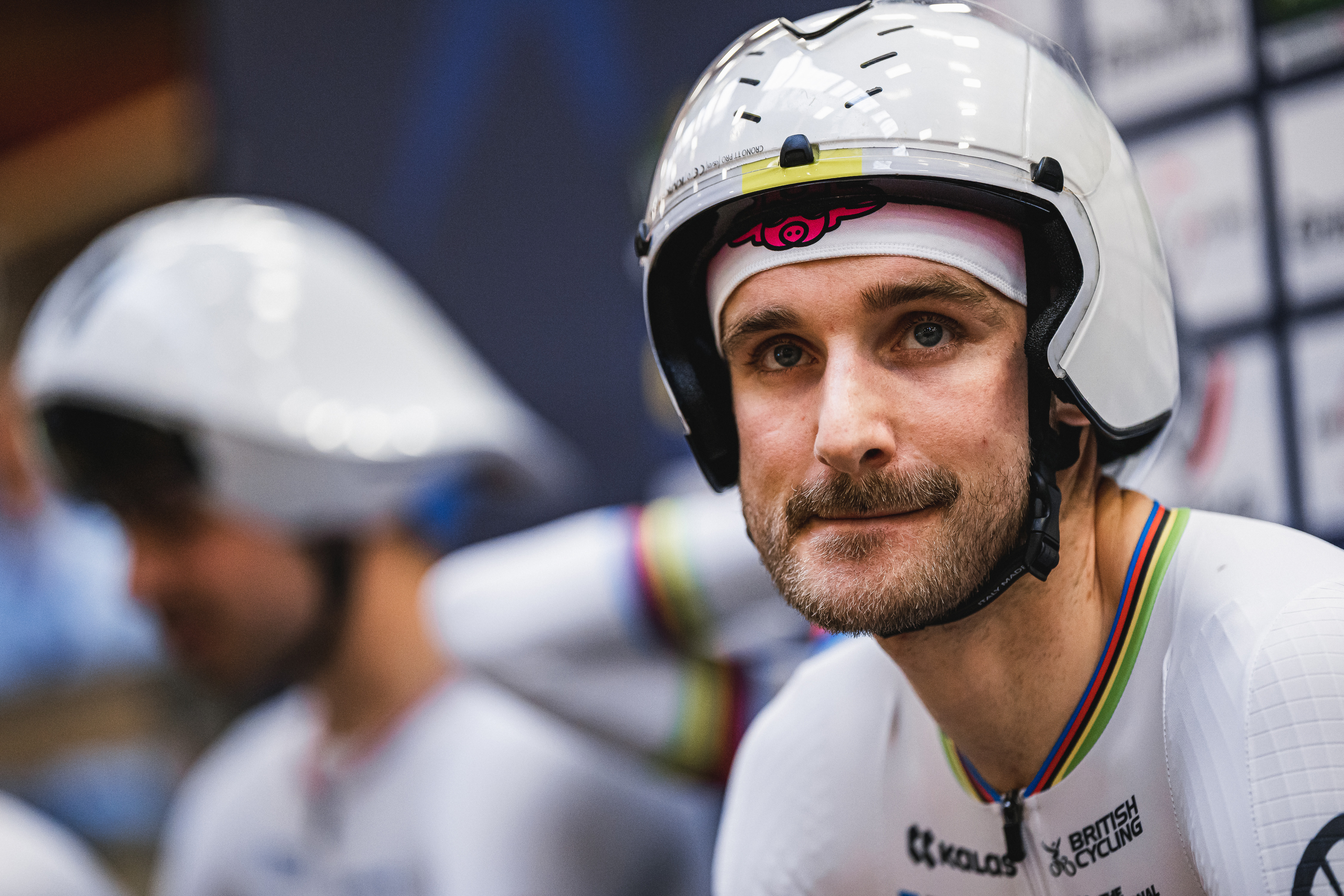
Rebuilding the bridge
So how did Bigham end up back in the system, a publicly-funded athlete with an Olympic tracksuit?
The initial point of reconciliation was the incoming national road cycling selector, Matt Brammeier, who offered Bigham a spot in the all-new Mixed Relay Team Time Trial event at the 2019 World Championships and then gave him the nod over WorldTour pro Alex Dowsett in the individual time trial at the 2021 Worlds.
The road arm of British Cycling, however, has always been very separate from the pressure cooker of the Olympic-conquering track behemoth. It wasn’t until the departure of Iain Dyer at the end of 2021 that the path could be cleared there. When Bigham turned up to the 2022 national championships and broke the national Individual Pursuit record with his first efforts since 2019, the new endurance coach Ben Greenwood invited him to do some rides with the Team Pursuit set-up. Suddenly, the bridge was rebuilt.
“I don’t want to pin it all on Iain Dyer,” Bigham says, and even though he adds a telling ‘but…’, it’s worth highlighting the huge turnover in staff at British Cycling from the late 2010s, a time of significant introspection within the British sporting system at large. A so-called ‘culture of fear’ had been identified in so many sporting federations that the only logical conclusion was that the ‘no-compromise’ funding model, which weighted public money to the biggest medal generators, necessitated as much. Medal generation became the means to an existence and somewhere along the way the human beings whose necks would bear these medals became lost in an increasingly toxic system.
All this is to say that British Cycling had a long-winded and deep-rooted clean-up act on its hands. And whereas someone like Bigham was once to be kept at a distance and whipped into line, he and his ideas are now welcomed with open arms.
“The biggest change in the system is that the athlete has a powerful voice now. And it’s not just a subjective voice; athletes nowadays understand the process of performance and come with more fluent ideas. Kudos to British Cycling for listening to that because I think that’s why we’re in a good place,” Bigham says.
He notes that British Cycling are “not naive enough” to let him in on every meeting, but his level of influence is clear to see. That track in Derbados gets a good run-out from a group of riders who are not confined to the national cycling centre but scattered around Europe with a certain freedom to structure their preparation around their other commitments.
“It’s not that I’m some saviour of British Cycling,” Bigham says. “I can’t sit here and say I’m some sort of player-manager,” he adds, before settling on a definition of his role as “the grandad of the group”.
Whatever it is, the British men’s Team Pursuit squad – made up of Bigham, Ethan Hayter, Ethan Vernon, Charlie Tanfield and Ollie Wood – are in a very good place indeed. In October 2022, mere months into the new regime, they were crowned world champions, beating Filippo Ganna’s Italy in Paris. Their title defence last autumn ended in disaster after a nasty crash for Charlie Tanfield, but at the start of this year, they clinched the European title with a 3:45.218 – three seconds off the world record.
“The Europeans were the acid test,” Bigham says. “The Danes put their A-team in, we put our A-team in, and we just beat them. They’re probably our closest competitors,” he adds, also noting Italy and even Japan as outsiders. “We’re very happy with our equipment selection, how we’ve optimised it, and physiologically everyone’s in very good shape. We’re quietly confident. We know what we need to do, and we just need to keep the ball rolling and go out and execute in Paris.”
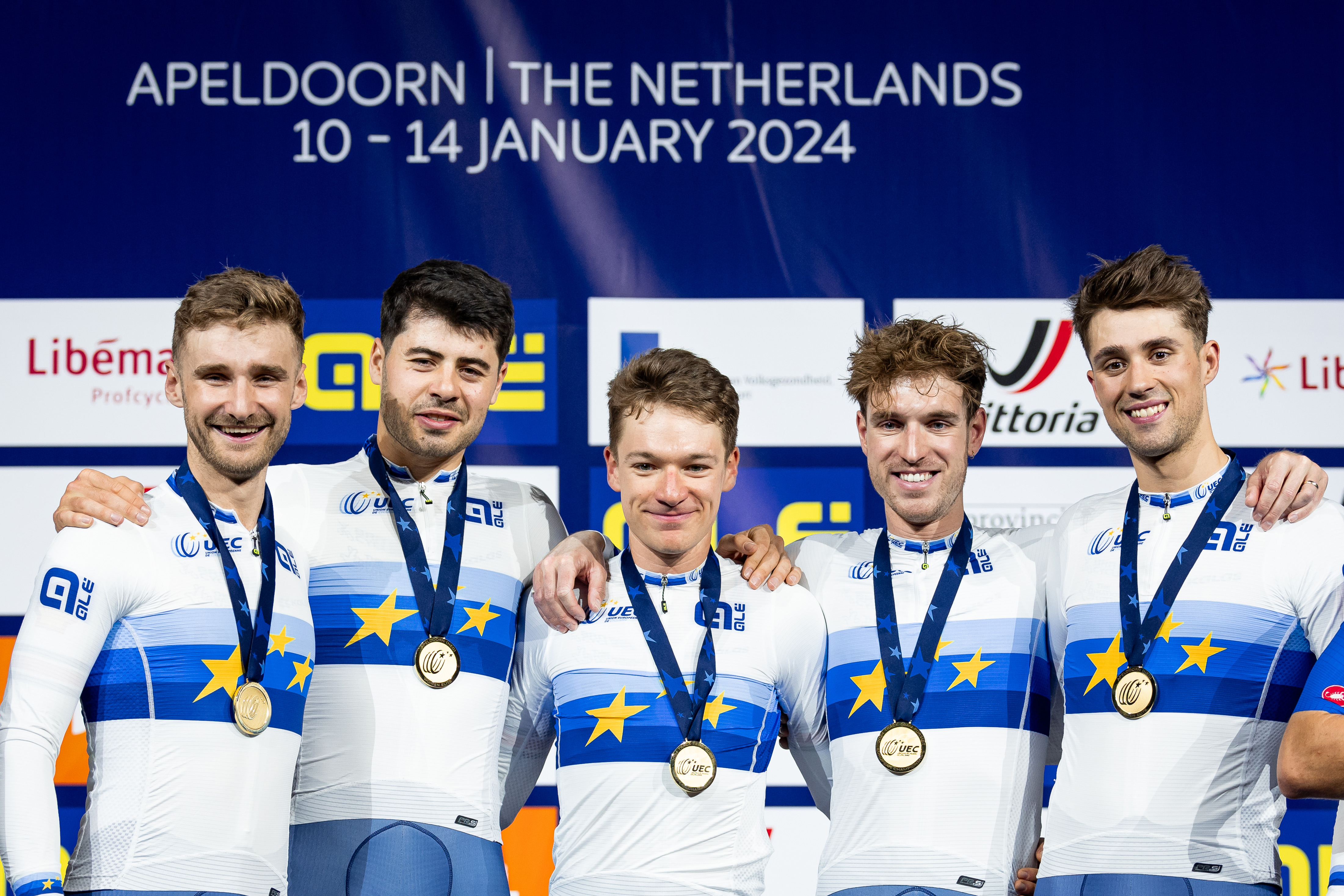
Executing his Olympic equation
It’s worth pointing out that Bigham is far from a mere science bod. He’d be the first to admit that his aero optimisations have made up for his physical limitations, but lately it doesn’t even seem like he has many of those. At last year’s Track Worlds he ran the superstar Filippo Gonna agonisingly close in the gold medal ride in the Individual Pursuit. His time of 4:02.030 would have been a world record just four years ago, and is quarter of a minute faster than Bradley Wiggins’ winning time when the event last appeared in the Olympics in 2008.
In fact, it was Bigham’s linking up with Ganna at Ineos Grenadiers, albeit as backroom staff, that opened up new physical possibilities. After a chance encounter with Dave Brailsford, he was hired in 2022 as a performance engineer, optimising the team’s equipment set-up while also leading the project around Filippo Ganna’s Hour Record, a process that saw Bigham take the record for himself as a sort of test before helping to tear it down. But the team have also helped him, and he credits the expert-laden environment at Ineos with his ‘really significant’ physiological improvements in the past two years, all while holding down a 9-5.
“It’s stuff I genuinely wish I’d known seven or eight years ago,” he says, not too proud to pretend he has all the answers, the irony being the one who would complain of his ideas not being listened to perhaps should have listened more to the ideas of others.
“My argument for focusing on aero is that you can make big leaps forward almost overnight, but physiology is such a long game – consistency of training, recovery, nutrition… all those things that I didn’t give enough credence to back in the day. That’s a frustration in one respect but at least I’ve learned it while it’s not too late, and I’ve got to the level where I can compete against the likes of Ganna – it’s nice to be able to say that.”
It’s interesting that Bigham describes himself and Ganna as “diametrically opposed” in terms of their approach to racing. The Italian, he says, races on ‘passion’ and ‘emotion’, whereas he ‘executes’ an equation that has been formulated in advance.
Asked whether the start block on an Olympic track might throw an intangible element of pure human emotion into that mathematical mix, such as a frisson of nerves or an extra beat per minute, his answer is telling: “The romantics in cycling might like to believe so, but my opinion is that you can probably measure anything, if you put enough resource into it.” At this point he runs away with a load of science jargon, but brings it back to conclude: “It’s a bit of a cold analytical answer to your question but I don’t feel there are intangibles; my opinion is very strongly that models can explain pretty much everything.”
It’d be easy to paint Bigham as this unfeeling number cruncher. Too easy, in fact. His subject matter may be ‘cold’, as he says, but when someone is this enthusiastic and passionate about it, it already becomes warmer, before you even factor in the subversive, anti-establishment element. Asked what he likes most about life outside cycling, he says “going on an adventure”, whether that’s with his wife and one-year-old son in the trails around their adopted home of Andorra, or trying to get under the skin of whichever part of the world he has the fortune to find himself in. The same can be said of his most meaningful pursuits within cycling, most notably those halcyon days with HUUB-Wattbike.
“I think a lot of us can reflect on times in our lives when we just felt like we were with a good bunch of people doing fun things,” he says wistfully. “It wasn’t dissimilar to being at university. There was more purpose and less partying, but it was that kind of lifestyle, where you’re all living together with a shared purpose and it was just fun, like actually good proper fun. When stuff came together and we had good results, that was just the icing on the cake.
“It’s hard now to enjoy cycling just as much. It’s one thing I’m looking forward to after the Olympics, going back to hopefully find those kinds of experiences again where you’re on an adventure with your mates, really. I guess that’s why things like gravel cycling have become more popular. Stuff like that you miss when everything becomes about peak performance and the sacrifices involved.”
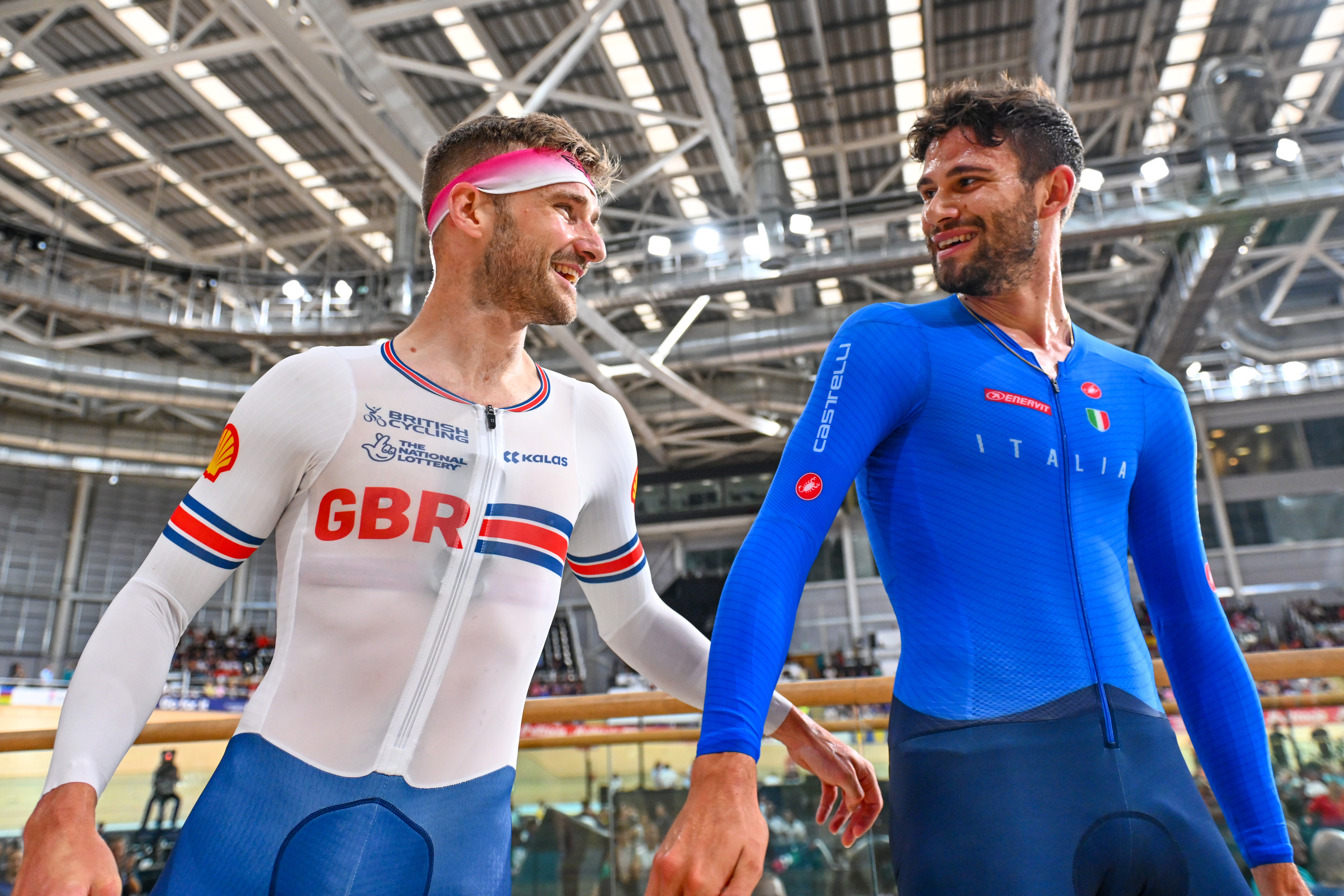
The thing about adventures is their outcomes are necessarily uncertain, incalculable. Perhaps, then, it’s as much about the process. Bigham might have a gold medal around his neck in two weeks’ time, but you get the feeling he wouldn’t be defined by it. So how would you sum up him up? Given the many fingers in many pies, and the unconventionality of it all, it’s not an easy task.
Over the course of our interview Bigham refers to himself on three separate occasions as a ‘randomer’, whether it was the ‘randomers from Derby’ who upended the track cycling world, or the randomer who caught the attention of Ineos when he took the British hour record off his own bat. It doesn’t seem like the most flattering term on the surface, but then again it does seem to get at many angles of the Bigham persona: a curiosity, underdog, misfit, maverick. There’s also a randomness to his own career path, which he describes as a series of doors closing and opening – he backtracks on saying ‘magically’ before settling on ’serendipitously’.
Models can explain anything, Dan Bigham says, just maybe not his own unique journey through the sport of cycling.


